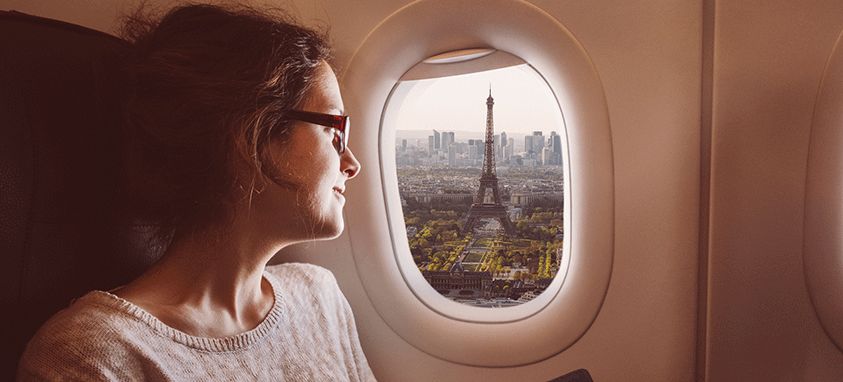A good flight begins with a healthy you
My younger brother had open-heart surgery. It came as a complete surprise. Not long ago, he collapsed on his daily, 5-mile walk in his Maryland neighborhood and was turning blue when the EMS crew arrived at the scene. When he awoke, he was in the hospital. The heart surgeon said there was little time to waste. In the operating theater, the surgical team removed so many blood clots from my brother’s chest they stopped counting.
What was to blame for my otherwise-healthy brother’s near demise? The diagnosis was deep-vein thrombosis, or DVT. He and his wife had flown 13 hours from Tokyo to New York City, and he had fallen asleep. Without exercise, clots formed in his leg and two weeks later, some broke free and traveled to his heart, blocking blood flow. He was lucky a clot didn’t reach his brain. He was lucky his heart was strong because of his daily exercise.
The precise number of people affected by DVT is unknown, says the Centers for Disease Control and Prevention, but estimates range as high as 900,000 people a year in the United States. As many as 25 percent of these die suddenly and with little warning.
In my brother’s case, at least, his DVT could likely have been prevented. Experts advise air travelers to get up and move around the cabin once an hour, especially on longer flights. To improve blood flow by thinning the blood and making it less likely to clot, taking low-dose aspirin (100–150 mg) the day before flying, during the flight and for three days after is another recommendation, as is wearing loose clothing to reduce constriction. Many seasoned travelers opt for knee-high compression socks, as well, because they increase blood circulation and thus help prevent formation of clots in the lower legs.
Flying is a fact of life for meetings professionals so taking precautions is essential. Check out the accompanying tips—and stay safe.
Before Flying
Amp up your immune system: Eat like a road warrior: unprocessed, whole foods, especially fruits and veggies, dark, leafy greens (kale, for instance) and vibrant fruits (berries) are best.
Moisturize: Humidity in airplane cabins can hover at around 2 percent (we humans are most comfy at 30–60 percent), so a spritz of nasal saline spray before boarding—and periodic reapplications in the air—can help keep delicate nasal membranes happy. Health journalist Melanie Haiken recommends the anti-nosebleed home remedy of moisturizing the nostrils with petroleum jelly or Neosporin. Of course, hydrating before, during and after the flight is essential, as well (more on this below).
In the Air
Pass on alcohol, coffee, too: Alcohol makes your cells’ metabolism less efficient at absorbing oxygen, which is already in reduced supply in a pressurized cabin where the air is similar to the atmosphere atop a 7,000-foot mountain. Both alcohol and caffeine act as diuretics to cause you to dehydrate faster. On longer flights, dehydration can lead to headaches and weaken your immunity defenses. Drink a cup or two of water per hour, experts say. If your lips are smooth and feel moist, you have found your hydration sweet spot.
Consider germ warfare: Crowded airports and airplanes mean your odds of exposure to something nasty are high. Health-conscious actress Gwyneth Paltrow wrote on her website, Goop, “They say Vitamin C in high doses wards off viruses and strengthens immunity, so once I get to my seat, I take four or five [Vitamin C] bad boys.”
Chew. Yawn. Swallow: Descent for landing equals ear pain for many, especially if you’re congested from allergies or a cold. Chewing gum, big yawns or repeated swallowing can help to open the eustachian tubes, which regulate pressure in your ears. Or try the Valsalva maneuver: with your mouth shut, gently squeeze your nose closed, then forcefully exhale through your nose.
Post Flight
Keep those healthy habits going: In the hours after landing, it’s important to continue to hydrate, eat healthily and get good sleep as your body adjusts to a different time zone and possibly a quite different diet and climate.
Jettison jet lag: For overcoming the effects of crossing time zones, The Harvard Health Publications website says get plenty of sleep before your trip, change your watch to the new time while still in the air, and force yourself to adjust your sleeping and eating schedule right away. “Get up in the morning when the locals do and get outside in the natural light. If you simply cannot stay awake until evening on the day you arrive, nap for no more than an hour or two. Engaging in social activities can also help your body clock adjust. When trying to stay awake, eat protein and vegetables and avoid starchy foods like pastas, breads and rice.”




